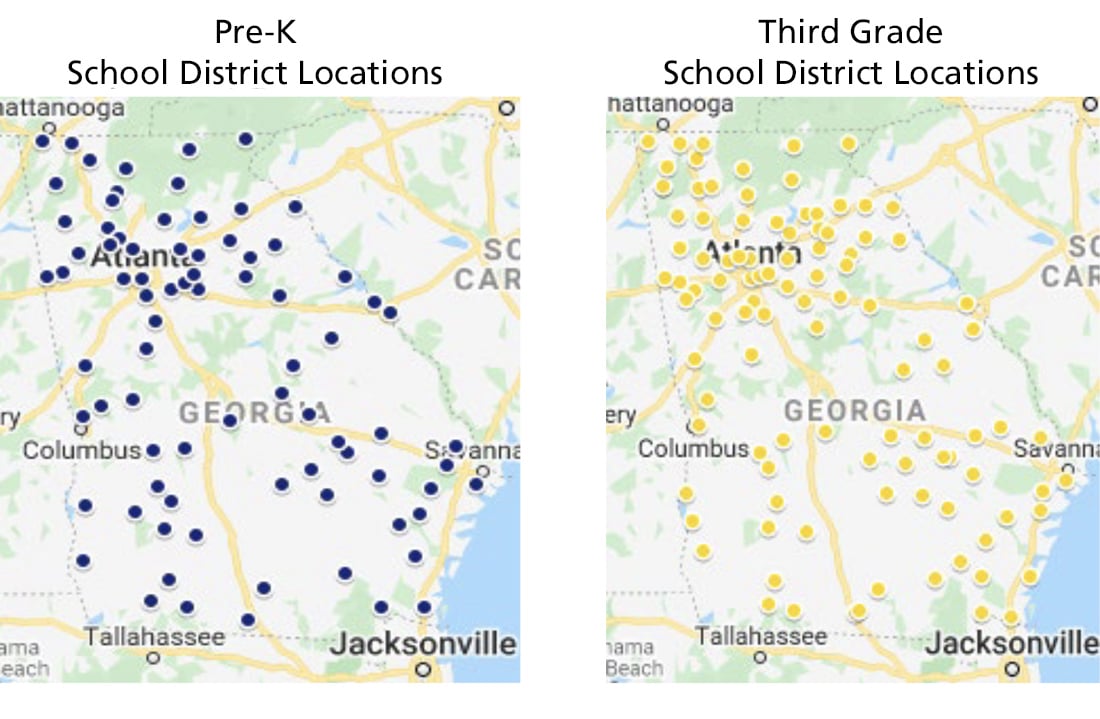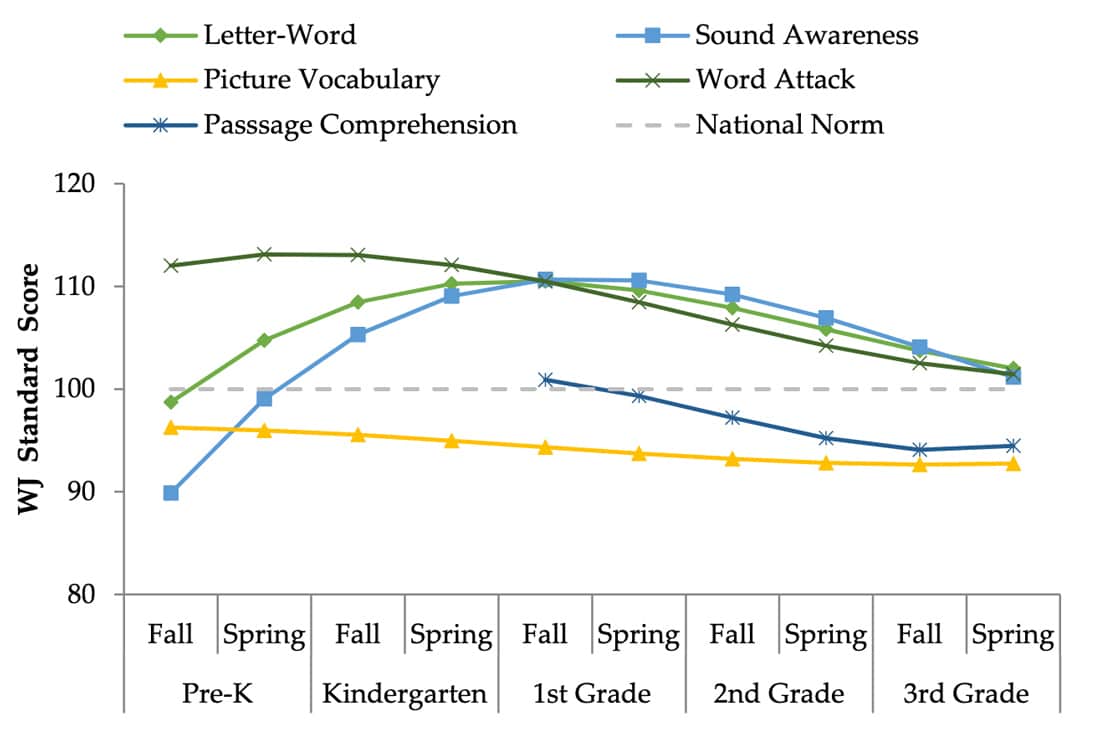Longitudinal Study of Georgia’s Pre-K Participants to Third Grade
Print This PostResearchers at the Frank Porter Graham Child Development Institute at the University of North Carolina at Chapel Hill conducted an extensive assessment of the Georgia Pre-K program’s impact on children as they continue through the third grade.
The study followed 1,169 children that were attending 199 different Georgia Pre-K programs across the state from their pre-K experience (2013 – 2014) through the third grade (2017 – 2018).

Statewide Distribution of Participating School Districts in Pre-K and Third Grade
The study, released in January 2021, explored:
- annual student assessments on language,
- literacy,
- math,
- executive function, and
- behavior skills.
Researchers also conducted parent and teacher surveys and classroom assessments.
Previous studies have found improved student performance in literacy, math, general knowledge, and behavior skills compared to peers who did not attend pre-K. The previous studies focused on differences in performance during kindergarten.
This study builds on the previous studies that Bright from the Start: Georgia Department of Early Care and Learning (DECAL) has conducted on the Georgia Pre-K program’s impact, expands the existing studies to examine Georgia Pre-K students’ performance as they progress through third grade, and includes comparisons to peers who did not attend a state pre-K program.
What the Researchers Found
The largest gains in language and literacy skills were during the pre-K and kindergarten years.
While students were at or below the national average in the third grade, they showed significant gains during pre-K and in kindergarten and first grade.
- Children who attended the Pre-K program continued to score slightly higher than the national average for reading skills related to decoding and phonics.
- Letter-Word and Sound Awareness showed the greatest gains during pre-K and kindergarten among the participating students.

Growth in Language and Literacy Skills (Pre-K – 3rd Grade)
Children who attended pre-K did better than peers who did not attend pre-k on:
- Language development,
- spoken language, and
- executive function.
Students who attended Georgia Pre-K performed better on Sound Awareness tests than students who did not attend pre-K. This is a key skill for language and literacy development and is set during early foundational years and more difficult to learn as they get older.
Georgia Pre-K students:
- showed relatively stable math skills over time,
- showed consistent executive functioning skills over time, and
- demonstrated improvements in language and literacy skills initially through the first grade.
What Our Communities Need to Do
Based on the findings from this study, there are several ways to put this information into action with community partners and activities.
- Georgia Pre-K programs make a difference in young children’s language development, particularly sound awareness skills that develop best during early child years. Families need to have access to a Georgia Pre-K program. Communities need to expand the availability of locations where children can build these skills.
- Ongoing after-school interventions may help students maintain the early gains they experience after pre-K and during kindergarten and first grade. Community leaders should explore other ways programs and resources could continue to support the gains students make and to reduce the loss of skills.
- Communities should investigate ways to increase the number of families utilizing Georgia Pre-K, ensuring that all slots are utilized and potentially examining ways to offer similar resources and supports to families who can’t access Georgia Pre-K.
- Communities should work together to discover, understand, and help address factors that are influencing families to use or not use Georgia Pre-K slots.
Read the Longitudinal Study of Georgia’s Pre-K Program Third Grade Report, January 2021.
Contact:
Reg Griffin
DECAL Communications Director
404-656-0239
reg.griffin@decal.ga.gov
Bill Valladares
GaFCP Communications Director
404-739-0043
william@gafcp.org
Follow us on Twitter: @gafcpnews
Connect with us on Facebook.
Bright from the Start: Georgia Department of Early Care and Learning is responsible for meeting the child care and early education needs of Georgia’s children and their families. It administers the nationally recognized Georgia’s Pre-K Program, licenses child care centers and home-based child care, administers Georgia’s Childcare and Parent Services (CAPS) program, federal nutrition programs, and manages Quality Rated, Georgia’s community powered child care rating system. The department also houses the Head Start State Collaboration Office, distributes federal funding to enhance the quality and availability of child care, and works collaboratively with Georgia child care resource and referral agencies and organizations throughout the state to enhance early care and education.
Georgia Family Connection Partnership (GaFCP) is a public-private partnership created by the State of Georgia and investors from the private sector to assist communities in addressing the serious challenges facing children and families. GaFCP also serves as a resource to state agencies across Georgia that work to improve the conditions of children and families. Georgia KIDS COUNT provides policymakers and citizens with current data they need to make informed decisions regarding priorities, services, and resources that impact Georgia’s children, youth, families, and communities.
